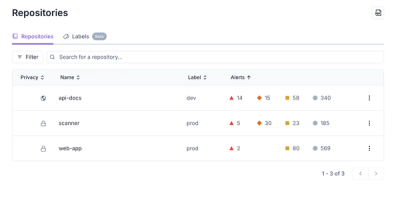
Product
Redesigned Repositories Page: A Faster Way to Prioritize Security Risk
Our redesigned Repositories page adds alert severity, filtering, and tabs for faster triage and clearer insights across all your projects.
This repo is a wrapper around the transformers library from Hugging Face :hugs:
Install from Pypi using:
pip install minicons
from minicons import cwe
model = cwe.CWE('bert-base-uncased')
context_words = [("I went to the bank to withdraw money.", "bank"),
("i was at the bank of the river ganga!", "bank")]
print(model.extract_representation(context_words, layer = 12))
'''
tensor([[ 0.5399, -0.2461, -0.0968, ..., -0.4670, -0.5312, -0.0549],
[-0.8258, -0.4308, 0.2744, ..., -0.5987, -0.6984, 0.2087]],
grad_fn=<MeanBackward1>)
'''
# if model is seq2seq:
model = cwe.EncDecCWE('t5-small')
print(model.extract_representation(context_words))
'''(last layer, by default)
tensor([[-0.0895, 0.0758, 0.0753, ..., 0.0130, -0.1093, -0.2354],
[-0.0695, 0.1142, 0.0803, ..., 0.0807, -0.1139, -0.2888]])
'''
from minicons import scorer
mlm_model = scorer.MaskedLMScorer('bert-base-uncased', 'cpu')
ilm_model = scorer.IncrementalLMScorer('distilgpt2', 'cpu')
stimuli = ["The keys to the cabinet are on the table.",
"The keys to the cabinet is on the table."]
# use sequence_score with different reduction options:
# Sequence Surprisal - lambda x: -x.sum(0).item()
# Sequence Log-probability - lambda x: x.sum(0).item()
# Sequence Surprisal, normalized by number of tokens - lambda x: -x.mean(0).item()
# Sequence Log-probability, normalized by number of tokens - lambda x: x.mean(0).item()
# and so on...
print(ilm_model.sequence_score(stimuli, reduction = lambda x: -x.sum(0).item()))
'''
[39.879737854003906, 42.75846481323242]
'''
# MLM scoring, inspired by Salazar et al., 2020
print(mlm_model.sequence_score(stimuli, reduction = lambda x: -x.sum(0).item()))
'''
[13.962685585021973, 23.415111541748047]
'''
s2s_model = scorer.Seq2SeqScorer('t5-base', 'cpu')
# sequence scoring for batch of input, output, by default = logprobs, can change to other quantities as needed (see minicons readme)
s2s_model.conditional_score(["What is the capital of France?", "What is the capital of France?"], ["Paris.", "Lyon."]) # the same thing works with ilm_model and mlm_model as well
'''OUTPUT:
[-6.089522838592529, -8.20227336883545]
'''
# Token-wise score of the output queries: -- <pad> token is given a score of 0.0, pass rank=True to also give token ranks
s2s_model.conditional_token_score(["What is the capital of France?", "What is the capital of France?"], ["Paris.", "Lyon."], rank=True)
'''OUTPUT:
[[('<pad>', 0.0, 0),
('Paris', -7.5618486404418945, 168),
('.', -4.617197036743164, 11)],
[('<pad>', 0.0, 0),
('Lyon', -12.044157981872559, 3459),
('.', -4.36038875579834, 8)]]
'''
This version leverages a locally-autoregressive scoring strategy to avoid the overestimation of probabilities of tokens in multi-token words (e.g., "ostrich" -> "ostr" + "#ich"). In particular, tokens probabilities are estimated using the bidirectional context, excluding any future tokens that belong to the same word as the current target token.
For more details, refer to Kauf and Ivanova, 2023
from minicons import scorer
mlm_model = scorer.MaskedLMScorer('bert-base-uncased', 'cpu')
stimuli = ['The traveler lost the souvenir.']
# un-normalized sequence score
print(mlm_model.sequence_score(stimuli, reduction = lambda x: -x.sum(0).item(), PLL_metric='within_word_l2r'))
'''
[32.77983617782593]
'''
# original metric, for comparison:
print(mlm_model.sequence_score(stimuli, reduction = lambda x: -x.sum(0).item(), PLL_metric='original'))
'''
[18.014726161956787]
'''
print(mlm_model.token_score(stimuli, PLL_metric='within_word_l2r'))
'''
[[('the', -0.07324600219726562), ('traveler', -9.668401718139648), ('lost', -6.955361366271973),
('the', -1.1923179626464844), ('so', -7.776356220245361), ('##uven', -6.989711761474609),
('##ir', -0.037807464599609375), ('.', -0.08663368225097656)]]
'''
# original values, for comparison (notice the 'souvenir' tokens):
print(mlm_model.token_score(stimuli, PLL_metric='original'))
'''
[[('the', -0.07324600219726562), ('traveler', -9.668402671813965), ('lost', -6.955359935760498), ('the', -1.192317008972168), ('so', -3.0517578125e-05), ('##uven', -0.0009250640869140625), ('##ir', -0.03780937194824219), ('.', -0.08663558959960938)]]
'''
Minicons now supports VLM scoring! The following code demonstrates how one can extract log-probs of caption/descriptions from Salesforce's BLIP-2 model, conditioned on a batch of images:
from minicons import scorer
from PIL import Image
# top image
penguin = Image.open('penguin.jpg')
# bottom image
cardinal = Image.open('cardinal.jpg')
lm = scorer.VLMScorer(
"Salesforce/blip2-opt-2.7b",
device="cuda:0"
)
lm.sequence_score(
text_batch=["This bird can fly."] * 2,
image_batch=[penguin, cardinal]
)
#> logprobs of penguin vs cardinal -> can fly
#> [-5.644123077392578, -5.129026889801025]
[!CAUTION] THIS IS NOW DEPRECATED BECAUSE OPEN-AI NO LONGER MAKES INPUT LOGPROBS AVAILABLE!**
Some models on the OpenAI API also allow for querying of log-probs (for now), and minicons now (as of Sept 29) also supports it! Here's how:
First, make sure you save your OpenAI API Key in some file (say ~/.openaikey). Register the key using:
from minicons import openai as mo
PATH = "/path/to/apikey"
mo.register_api_key(PATH)
Then,
from minicons import openai as mo
stimuli = ["the keys to the cabinet are", "the keys to the cabinet is"]
# we want to test if p(are | prefix) > p(is | prefix)
model = "gpt-3.5-turbo-instruct"
query = mo.OpenAIQuery(model, stimuli)
# run query using the above batch
query.query()
# get conditional log-probs for are and is given prior context:
query.conditional_score(["are", "is"])
#> [-2.5472614765167236, -5.633198261260986] SUCCESS!
# NOTE: this will not be 100% reproducible since it seems OpenAI adds a little noise to its outputs.
# see https://twitter.com/xuanalogue/status/1653280462935146496
model.token_score() and model.sequence_score() with MaskedLMScorers as well!within_word_l2r, a better way to do MLM scoring, thanks to Carina Kauf (https://github.com/carina-kauf) 🥳If you use minicons, please cite the following paper:
@article{misra2022minicons,
title={minicons: Enabling Flexible Behavioral and Representational Analyses of Transformer Language Models},
author={Kanishka Misra},
journal={arXiv preprint arXiv:2203.13112},
year={2022}
}
If you use Kauf and Ivanova's PLL scoring technique, please additionally also cite the following paper:
@inproceedings{kauf2023better,
title={A Better Way to Do Masked Language Model Scoring},
author={Kauf, Carina and Ivanova, Anna},
booktitle={Proceedings of the 61st Annual Meeting of the Association for Computational Linguistics (Volume 1: Long Papers)},
year={2023}
}
A non-exhaustive but fun list of ppl:
FAQs
A package of useful functions to analyze transformer based language models.
We found that minicons demonstrated a healthy version release cadence and project activity because the last version was released less than a year ago. It has 1 open source maintainer collaborating on the project.
Did you know?

Socket for GitHub automatically highlights issues in each pull request and monitors the health of all your open source dependencies. Discover the contents of your packages and block harmful activity before you install or update your dependencies.

Product
Our redesigned Repositories page adds alert severity, filtering, and tabs for faster triage and clearer insights across all your projects.

Security News
Multiple deserialization flaws in PyTorch Lightning could allow remote code execution when loading untrusted model files, affecting versions up to 2.4.0.

Security News
NVD now marks all pre-2018 CVEs as "Deferred," signaling it will no longer enrich older vulnerabilities, further eroding trust in its data.